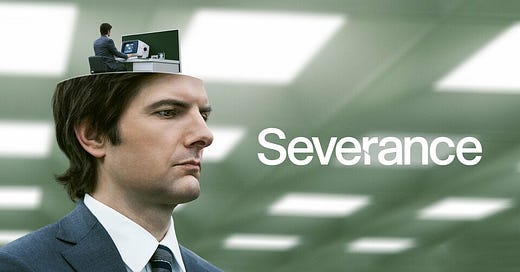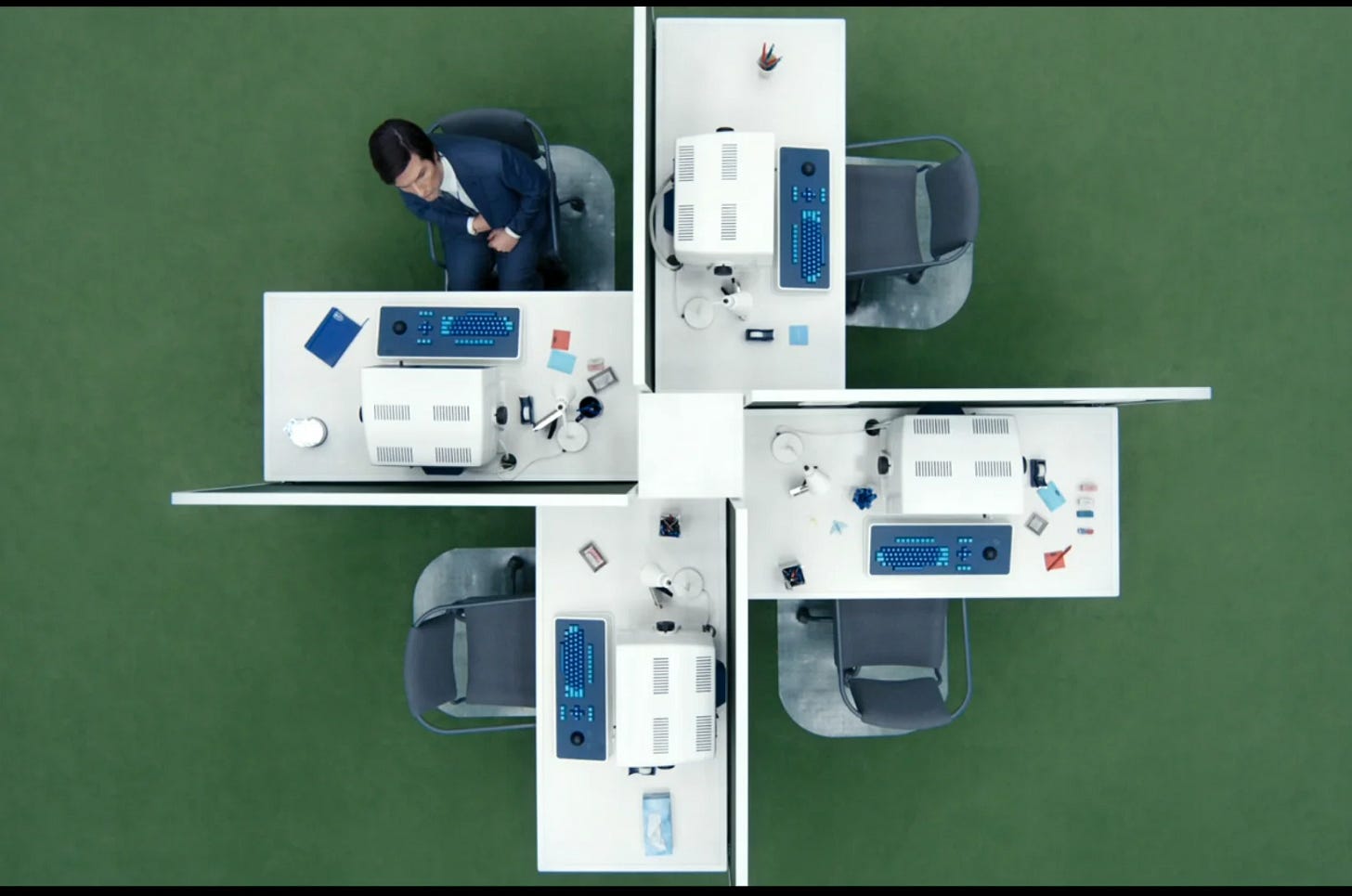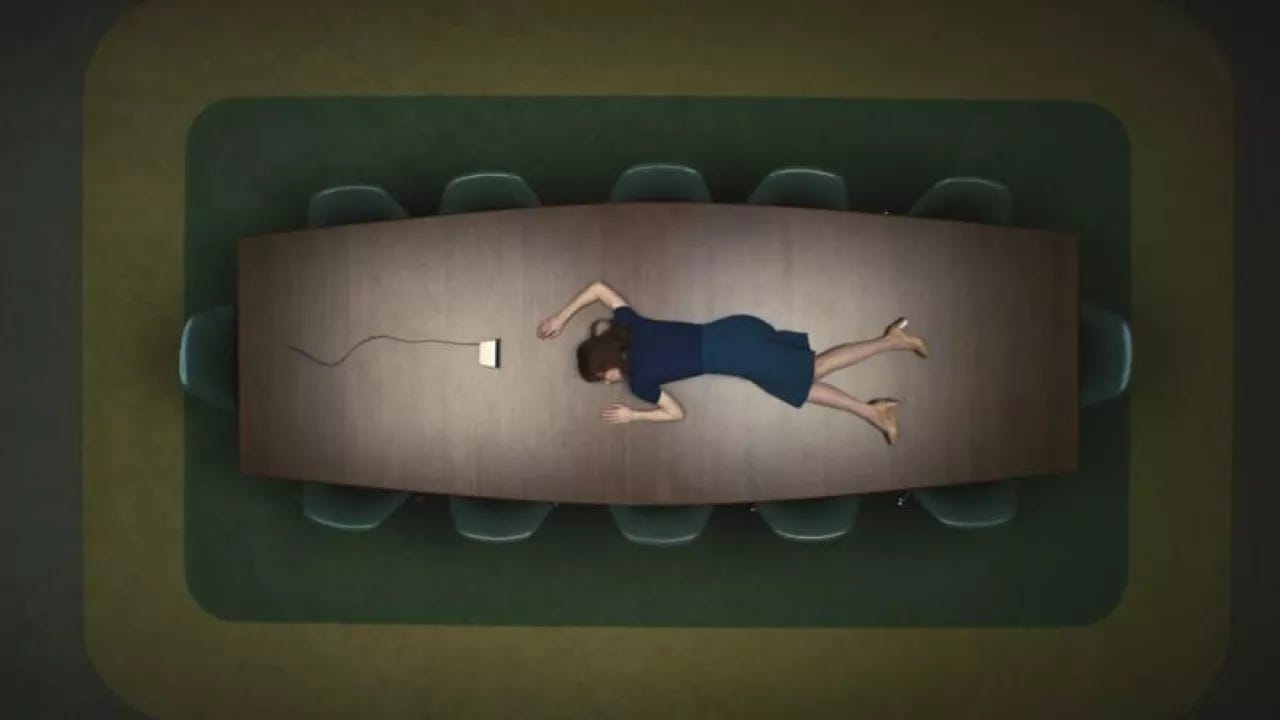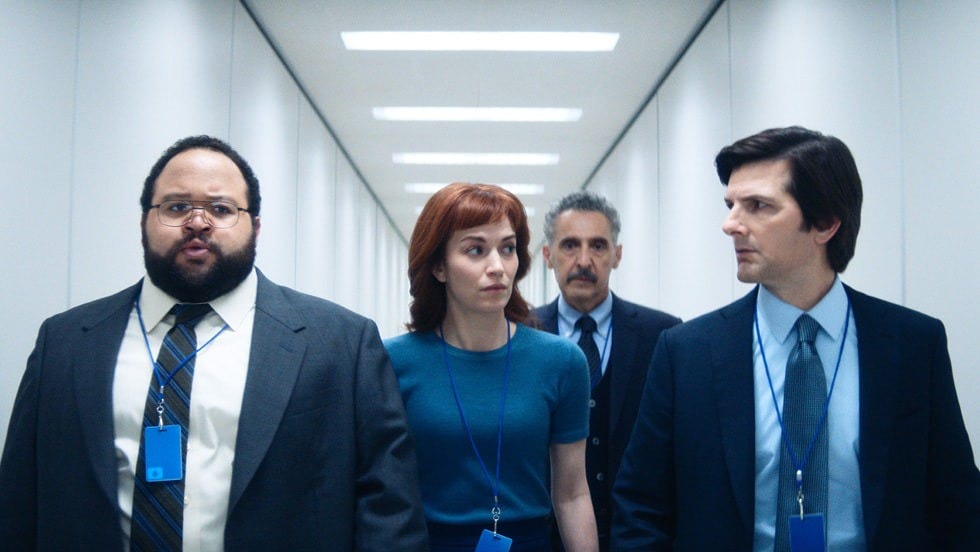Severance - TV Series Reviews #1
Severance. What if we forgot our identities when going to our 9-to-5 jobs? Would we still be the same person there? Great hook, perfect theme, deep characters. One of my Top 10 TV shows.
Hello there! I’m Nur from In Pursuit of Beautiful Meaning. I write about productivity tips, creative reflections, and book/film reviews. If you’re new here, pop your email below to make sure you receive my posts. I’m still figuring out how often I’ll write, but you can expect 2 or 3 posts a month for now. As someone who watches a lot of TV shows and works in TV distribution, in this essay I’ll be talking about Severance. Hope you enjoy it!
Just a heads-up: this first chapter contains no spoilers, but the rest will. That said, I’ll still be sharing my overall opinion on both seasons here — whether I think they’re good or not. So if it’s on your watch list, feel free to stop reading here—no hard feelings :)
If you’re looking for a character-driven, conflict-packed series—one that hooks you so much you immediately want to watch the next episode—and if you enjoy stories that feel like solving a puzzle, I definitely recommend Severance.
Some shows feel so unrealistic and detached when it comes to their characters that I get bored really quickly. This one didn’t bore me at all—on the contrary, it made me think, made me fall in love with its world, and never gave me that feeling of “someone is just making up a story to keep me in front of the screen” (which, honestly, most shows do). The fact that the creator, Dan Erickson, came up with the idea based on his own corporate experience also makes the show’s origin feel sincere and authentic.
Each first-season episode conveys the story perfectly, and the pacing—neither too fast nor too slow—is spot on. I like the captivating atmosphere of its mystical universe, the director’s color choices and its cinematography. The season one finale gives you an “Oh my God, how am I supposed to wait for the next season?” moment.
Some of the people I talked to about the show didn’t like it much, while others are huge fans. Those who didn’t like it found the world a bit boring. I, however, love character‑driven stories—seeing real depth, knowing each character has a backstory, believing in their authenticity—and I thought the show did this brilliantly, so I loved it.
The creator’s concept comes from a simple place: the boredom of a 9‑to‑5, feeling like a robot, and the question, “What if we forget who we are when we go to work?” Of course, that’s just a theme—you can shape it however you like. Personally, I felt they executed it well in the first season, sparking genuine curiosity and crafting each character’s internal and interpersonal conflicts great.
After finishing season one, my reaction was, “This is such a difficult task—bringing it to a strong conclusion, avoiding clichés, and delivering something truly original and imaginative. May God help the writers for them to make all that work.” I was optimistic because I thought, “If they prepared the first season this well, they can nail the second one too.”
But unfortunately, it didn’t turn out that way. Season two disappointed me—with its watered‑down episodes, its tendency to introduce mysteries only to pretend they never happened, and a finale that forced characters into actions I just didn’t believe they would take (probably because the writers couldn’t get things work.).
If I were writing this show, the first question I’d ask when plotting season two would be: “Where do these deep characters want to go from here? If they head in that direction, how many different paths could the story take—and which combination is both the most logical and the most interesting?” Instead, it felt like the writers started with, “How can we set up a third season?” Aiming to make it commercial isn’t bad—the show proved in season one that you can be both authentic and commercially successful. But watching season two left me full of “I wish”s.
Disclaimer: From now on, I’ll give some spoilers. You can continue reading if you’ve already watched both seasons or if you’ve decided not to watch it (though I don’t think you should—everyone should experience how amazing the first season is, and who knows, maybe they’ll make it all work on season three).
Mixed Feelings
First scene: Helly R. wakes up at a large conference‑room table. Someone outside the room speaks to her over the speaker, asking “Who are you?” She realizes that she can’t remember who she is, which shocks her. Next, they lead her into a big room filled with old 1980s computers and seat her at a big table where four people work at adjacent desks. They explain that the work is hovering over certain numbers on a computer, and if she feels an unsettling sensation, she must drag those numbers into the trash. You think, “What are these numbers?” In my opinion, the explanations they give in season two are very weak. Also, although I’m a huge fan of the show’s casting, there’s one person who pulls me right out of the story every time I see her: Harmony Cobel, played by Patricia Arquette. Her performance doesn’t click with me; it doesn’t make sense, and she speaks so slowly in an attempt to add mystery, but it just doesn’t work for me.
After watching season two, I came to this conclusion: introducing mysterious elements without fully developing them feels weak. Dark by Netflix, for example, did this brilliantly by writing all three seasons before even starting production on the first one. Not every series can do that—and realistically, most won’t—but I’m a huge fan of at least having a rough storyline for all seasons before production begins.
Here are the question marks I have after watching both seasons:
If the goal is to achieve Cold Harbour, why do they need external employees? Sure, they might need staff—but why specifically severed people?
And once you’ve achieved Cold Harbour, why do you have to kill that person afterward? What’s the point? It just seems like a challenge for our lead character, Mark. But without explaining why, it’s not believable. I’m not convinced Lumon actually needs to kill Gemma.
In season one, when I first saw the goats, I wondered, “What on earth is that about?” In season two, they appeared only twice and felt unnecessary. Why are they raising goats?
What happened to the doctor who was trying to reintegrate Mark? Didn’t it look like reintegration was happening at the end of one of the early episodes? Why didn’t we see it again? It felt like that plot thread was added just to keep us watching—and then everyone acted as if it didn’t happen.
What is the true core of this show? Why did Kier/Lumon create the Severance procedure? We haven’t seen answers to these questions yet—but if the producers happen to stumble upon this essay, I hope they know we’re eagerly awaiting a good explanation.
The first episode of season two was strong, and I really liked the idea they came up with to bring the characters back to the office. I wish the rest of the season had continued with the same level of effort. Maybe there were just too many mysteries introduced, and it became messy trying to connect all the dots. I think they’ll need to be very careful in season three to make it compelling, captivating, and well-paced again. Season two felt too light in terms of story intensity.
Some Positive Thoughts
The twist on Helly’s innie character versus her real‑world self is fantastic. The series tackles a conflict you rarely see on TV—when a character is literally in conflict with themselves (a concept you also find in Living with Yourself by Netflix and Dark Matter by Apple TV, both great shows). I especially love how this series does it, because each character’s conflict isn’t focused on a single goal. Helly, Mark, Dylan, and Irving each have their own 'innie' and 'outie' journeys, and each character has two simultaneous goals.
With Helly, we see how we sacrifice parts of ourselves to meet others’ expectations. Despite her wealth, her outie isn’t free—and never will be—because of her family legacy. Helena lacks the kindness and freedom Helly R. has.
With Dylan, his real‑life wife, feels closer to his innie: perhaps that innie thrives when supported by his colleagues. His outie, having never had that support and surrounded by doubters, and seems like he has given up on himself.
Then there’s Irving, whose past remains mysterious—I hope it gets more focus in the third season. Was he once a soldier? Why is he so obsessed with researching Lumon? Has painting shaped his life beyond a mere hobby—has he even held exhibitions and gained a reputation as an artist?
Mark’s innie and outie are similar, yet his innie is profoundly influenced by his brother‑in‑law’s book, while his outie dismisses it as it sounds full of cliches. But for someone who’s never read a book like that and who’s experienced the severance procedure, its depth becomes clear to Mark’s innie and actually plays a huge role in innie’s character development. It made me think, how often do we dismiss things because of our prejudice, and lose whatever insights they might offer? Our social norms push us to judge people by their branding of “winner” or “loser,” and then decide whose words deserve our attention.
Overall, thanks to its authenticity, well-crafted characters, successful world-building, excellent casting, and relatable theme, Severance is one of the best TV series of the past few years. I truly hope we get a great third season with clever answers to all the mysteries.








